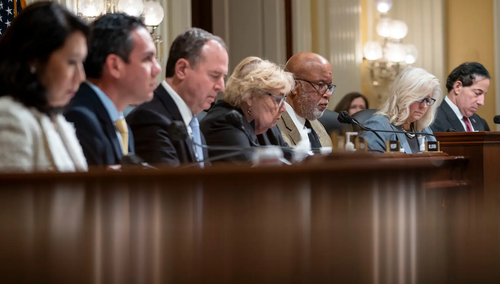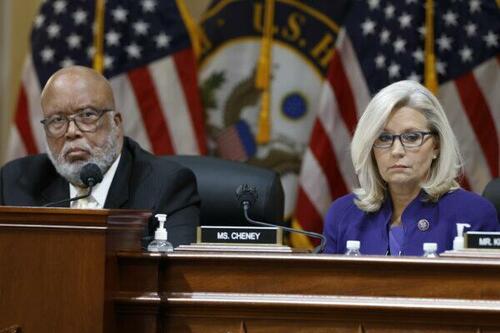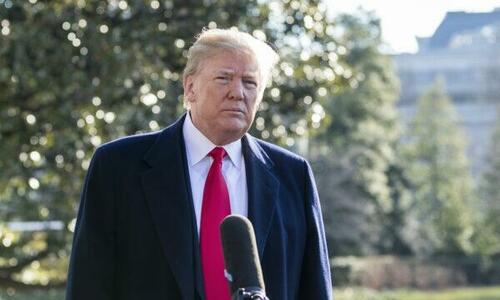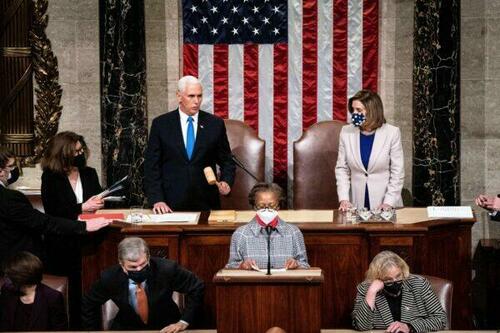
Days after releasing an executive summary, the Jan. 6 Committee has released its full, 814-page report, which encourages the Justice Department (DOJ) to consider slapping former President Trump with at least four criminal charge, including insurrection and obstruction.
The referral is largely symbolic, as the DOJ isn't required to act on the panel's recommendations.
The nine-member committee, whose members are known for their partisan anti-Trump members (while pro-Trump lawmakers were denied an opportunity to sit on the panel), concluded that "the central cause of January 6th was one man, former President Donald Trump, who many others followed," adding that "[n]one of the events of January 6th would have happened without him."
This guy couldn't have had anything to do with it, right?
As the Epoch Times notes,
The group’s final report represents the culmination of 18 months of investigation and is based on the interviews of more than 1,000 witnesses, ten hearings, as well as millions of pages of documents, including emails, texts, and phone records.
The report lists 17 specific allegations the authors made based on the information they gathered. It also proposes 11 legislative recommendations in efforts to prevent another breach.
“This report will provide greater detail about the multistep effort devised and driven by Donald Trump to overturn the 2020 election and block the transfer of power,” Jan. 6 Committee Chairman Rep. Bennie Thompson (D-Miss.) wrote in a foreword in the report.
The Jan. 6 committee is set to dissolve at the end of the current Congress in January 2023, when Republicans are set to take control of the House.

‘Highly Partisan’
Trump, in remarks following the release of the final report, called it “highly partisan” and a “witch hunt.” The report had failed to “study the reason for the [Jan. 6] protest, election fraud,” he wrote.
It marked the first time that lawmakers had referred a former president for criminal prosecution. A charge of insurrection would, if a conviction is passed, bar Trump from running for office again. Trump had announced in November that he would seek the presidency again.
Trump was previously acquitted in February 2021 by the Senate in an impeachment trial over an insurrection incitement charge. Prior to that, he was acquitted in February 2020 by the Senate in his first impeachment trial on two charges—abuse of power and obstruction of Congress.
“These folks don’t get it that when they come after me, people who love freedom rally around me. It strengthens me. What doesn’t kill me makes me stronger,” Trump wrote in a statement posted on his Truth Social platform on Dec. 19 in response to the panel’s criminal referrals.
He added, “Americans know that I pushed for 20,000 troops to prevent violence on Jan 6, and that I went on television and told everyone to go home.”

Counter Report
Ahead of the final report’s release, the Jan. 6 committee made public a collection of 34 transcripts of witness testimony from its investigation on Dec. 21. Most of the 34 witnesses did not answer questions during all or at least part of their testimony, instead opting to assert their Fifth Amendment right against self-incrimination. The panel later released several more transcripts of witness testimony on early Dec. 22.
Meanwhile, five House Republicans on Dec. 21 published a separate counter report (pdf) that focused on the security failures at the U.S. Capitol on Jan. 6. The report, led by incoming House Judiciary Chairman Jim Jordan (R-Ohio) and Rep. Jim Banks (R-Ind.), showed that staffers under House Speaker Nancy Pelosi (D-Calif.) had played a key role in the security planning that failed to protect the Capitol on Jan. 6, 2021.
The five lawmakers who released the report were those initially nominated by Republican Leader Kevin McCarthy (R-Calif.) to join the Jan. 6 committee. Pelosi had previously refused to seat two of the five, after which all were pulled from consideration. McCarthy, in response, had called Pelosi’s move “an egregious abuse of power.”

The joint session of Congress on Jan. 6, 2021, was temporarily interrupted when a sizable group of protesters entered the Capitol building and its surrounds. Outside were thousands of other mostly peaceful protesters who had gathered in Washington on the day to express concerns about election integrity.
A total of five deaths were recorded in the immediate aftermath of the Jan. 6, 2021 incident. Three of the deaths were ultimately determined to be natural causes, one of the deaths was ruled a homicide due to actions of a Capitol Police officer, and the remaining death was ruled as an accident, but video unsealed in December 2021 suggested that the person was struck by a police officer prior as she lay unconscious near the Capitol building.
As of late December, more than 900 individuals have been dealt charges by the DOJ, accusing them of having committed federal crimes on Jan. 6, 2021. More than 480 of them have pleaded guilty to one or more charges.
Days after releasing an executive summary, the Jan. 6 Committee has released its full, 814-page report, which encourages the Justice Department (DOJ) to consider slapping former President Trump with at least four criminal charge, including insurrection and obstruction.
The referral is largely symbolic, as the DOJ isn’t required to act on the panel’s recommendations.
The nine-member committee, whose members are known for their partisan anti-Trump members (while pro-Trump lawmakers were denied an opportunity to sit on the panel), concluded that “the central cause of January 6th was one man, former President Donald Trump, who many others followed,” adding that “[n]one of the events of January 6th would have happened without him.”
This guy couldn’t have had anything to do with it, right?
As the Epoch Times notes,
The group’s final report represents the culmination of 18 months of investigation and is based on the interviews of more than 1,000 witnesses, ten hearings, as well as millions of pages of documents, including emails, texts, and phone records.
The report lists 17 specific allegations the authors made based on the information they gathered. It also proposes 11 legislative recommendations in efforts to prevent another breach.
“This report will provide greater detail about the multistep effort devised and driven by Donald Trump to overturn the 2020 election and block the transfer of power,” Jan. 6 Committee Chairman Rep. Bennie Thompson (D-Miss.) wrote in a foreword in the report.
The Jan. 6 committee is set to dissolve at the end of the current Congress in January 2023, when Republicans are set to take control of the House.

‘Highly Partisan’
Trump, in remarks following the release of the final report, called it “highly partisan” and a “witch hunt.” The report had failed to “study the reason for the [Jan. 6] protest, election fraud,” he wrote.
It marked the first time that lawmakers had referred a former president for criminal prosecution. A charge of insurrection would, if a conviction is passed, bar Trump from running for office again. Trump had announced in November that he would seek the presidency again.
Trump was previously acquitted in February 2021 by the Senate in an impeachment trial over an insurrection incitement charge. Prior to that, he was acquitted in February 2020 by the Senate in his first impeachment trial on two charges—abuse of power and obstruction of Congress.
“These folks don’t get it that when they come after me, people who love freedom rally around me. It strengthens me. What doesn’t kill me makes me stronger,” Trump wrote in a statement posted on his Truth Social platform on Dec. 19 in response to the panel’s criminal referrals.
He added, “Americans know that I pushed for 20,000 troops to prevent violence on Jan 6, and that I went on television and told everyone to go home.”

Counter Report
Ahead of the final report’s release, the Jan. 6 committee made public a collection of 34 transcripts of witness testimony from its investigation on Dec. 21. Most of the 34 witnesses did not answer questions during all or at least part of their testimony, instead opting to assert their Fifth Amendment right against self-incrimination. The panel later released several more transcripts of witness testimony on early Dec. 22.
Meanwhile, five House Republicans on Dec. 21 published a separate counter report (pdf) that focused on the security failures at the U.S. Capitol on Jan. 6. The report, led by incoming House Judiciary Chairman Jim Jordan (R-Ohio) and Rep. Jim Banks (R-Ind.), showed that staffers under House Speaker Nancy Pelosi (D-Calif.) had played a key role in the security planning that failed to protect the Capitol on Jan. 6, 2021.
The five lawmakers who released the report were those initially nominated by Republican Leader Kevin McCarthy (R-Calif.) to join the Jan. 6 committee. Pelosi had previously refused to seat two of the five, after which all were pulled from consideration. McCarthy, in response, had called Pelosi’s move “an egregious abuse of power.”

The joint session of Congress on Jan. 6, 2021, was temporarily interrupted when a sizable group of protesters entered the Capitol building and its surrounds. Outside were thousands of other mostly peaceful protesters who had gathered in Washington on the day to express concerns about election integrity.
A total of five deaths were recorded in the immediate aftermath of the Jan. 6, 2021 incident. Three of the deaths were ultimately determined to be natural causes, one of the deaths was ruled a homicide due to actions of a Capitol Police officer, and the remaining death was ruled as an accident, but video unsealed in December 2021 suggested that the person was struck by a police officer prior as she lay unconscious near the Capitol building.
As of late December, more than 900 individuals have been dealt charges by the DOJ, accusing them of having committed federal crimes on Jan. 6, 2021. More than 480 of them have pleaded guilty to one or more charges.
Loading…






